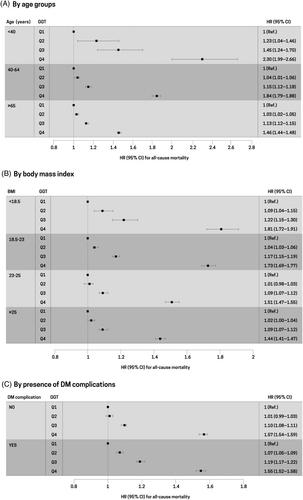Gamma-glutamyl transferase and the risk of all-cause and disease-specific mortality in patients with diabetes: A nationwide cohort study
Abstract
Background
There exists a paucity of data regarding whether gamma-glutamyl transferase is associated with disease-specific mortality in patients with type 2 diabetes mellitus. This study aimed to investigate the association of serum gamma-glutamyl transferase levels with all-cause and disease-specific mortality in patients with diabetes mellitus using a Korean nationwide health-screening database.
Methods
A total of 9 687 066 patients without viral hepatitis or liver cirrhosis who underwent health examination in 2009 were included. These patients were divided into four groups according to sex-specific quartiles of serum gamma-glutamyl transferase levels.
Results
During a median follow-up period of 8.1 years, 222 242 deaths were identified. The all-cause mortality rate increased as the serum gamma-glutamyl transferase levels became higher (highest quartile vs lowest quartile: hazard ratio [HR], 1.57; 95% confidence interval [CI], 1.55–1.59; p for trend <.001). Similar trends were observed for cardiovascular disease (HR, 1.57; 95% CI, 1.53–1.62), ischemic heart disease (HR, 1.40; 95% CI, 1.33–1.48), and stroke (HR, 1.72; 95% CI, 1.60–1.85) in the highest quartile, as compared with the lowest quartile (p for trend <.001). As the gamma-glutamyl transferase quartiles became higher, mortality rates related to cancer (HR, 1.56; 95% CI, 1.52–1.60), liver disease (HR, 9.42; 95% CI, 8.81–10.07), respiratory disease (HR, 1.55; 95% CI, 1.49–1.62), and infectious disease (HR, 1.73; 95% CI, 1.59–1.87) also increased in the highest quartile, compared with the lowest quartile (p for trend <.001).
Conclusions
Serum gamma-glutamyl transferase levels may be useful for the risk assessment of all-cause and disease-specific mortality among patients with type 2 diabetes mellitus.


 求助内容:
求助内容: 应助结果提醒方式:
应助结果提醒方式:


